Cost of living: People gambling to pay energy bills, says union leader
- Published
Cost of living: 'Even Boris (Johnson's) friends will get £400 - do they need it?'
People are gambling to try to pay off soaring gas and electric bills, a trade union leader has warned on the day extra help with charges was unveiled.
All UK households will get an energy bill discount of £400 this autumn, Chancellor Rishi Sunak announced.
Earlier, the Wales TUC's Shavanah Taj said pensioners were "being forced to return to work" to make ends meet.
She said teaching staff were working extra shifts in shops and hospitality to cope with the cost of living crisis.
One woman from Wrexham said she had been left with only £12.36 to last her until 18 June, forcing her to skip meals.
Carole Anne Wilson, 57, who lives alone, was forced to retire in 2019 after being diagnosed with a series of illnesses and receives Universal Credit.
Asked about Mr Sunak's measures, she said: "There's just not enough being done... there's no where for me to turn."
What is the payment?
After mounting pressure on UK ministers to do more to help people with the cost of living, Mr Sunak told MPs the poorest households would get a one-off payment of £650.
There will also be a £300 one-off payment for 8 million pensioner households.
Homes not connected to the gas grid - thought to be about 19% of homes in Wales - will receive £400, Mr Sunak said.
The £15bn package of new measures will be partly funded through a 25% windfall tax on oil and gas firms' profits which have soared in recent months.
"We have a collective responsibility to help those who are paying the highest price for the high inflation we face," the chancellor said.
"That is why I'm targeting this significant support to millions of the most vulnerable people in our society."
Rishi Sunak says eight million households will get £1,200 in support, when combining measures announced on Thursday and before.
Wales' First Minister Mark Drakeford said the measures "barely scratch the surface".
Mr Sunak's statement came hours after Wales TUC general secretary Ms Taj addressed an inquiry into the cost of living by the Senedd's economy committee.
She said while people on the very lowest incomes were being hit hardest by price rises, she was also hearing examples of how public sector workers were "very much now being squeezed".
"We've heard over the last couple of days [about] people who work even, for example, in schools, teaching staff, teaching assistants, taking on additional jobs in the evening, working extra hours in the hospitality sector, taking on additional shifts in retail as well in big supermarkets and so forth as well," she said
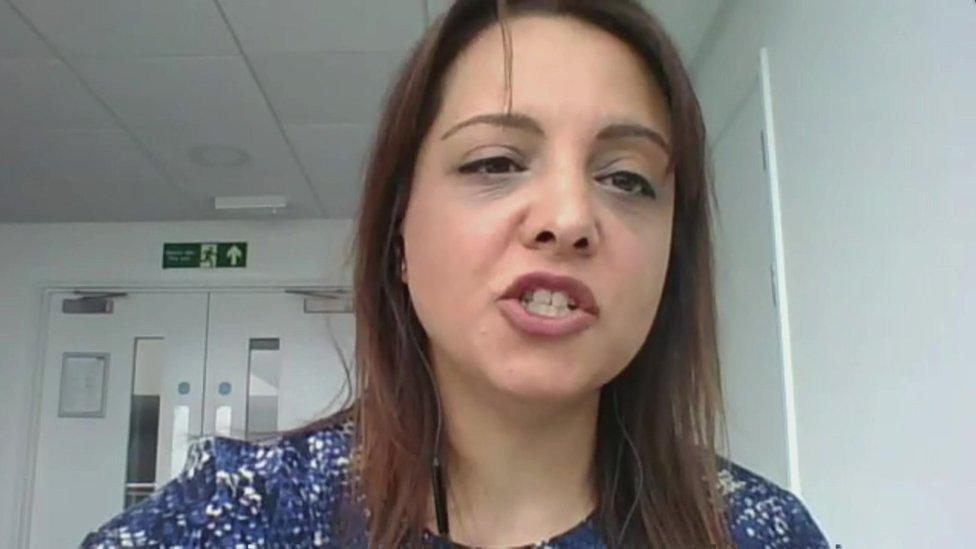
Shavanah Taj says she is hearing worrying stories every day about the impact of rising prices
Ms Taj said she worried about rising debt levels.
"Over the last couple of days, we've actually been hearing from people who were saying that they are dealing with personal cases from [trade union] members who've begun gambling as a means to try and pay off a gas or electric bill."
Pensioners, she said, were "being forced to return to work actually, because their pensions are now not worth what it was that they thought it was going to be because of the cost of living crisis".
The Treasury said the Welsh government would receive an extra £25m of funding to use as it decides as a result of other measures in the chancellor's package that are for England only.
Earlier this week, UK energy regulator Ofgem said the typical household energy bill was set to rise by £800 in October, bringing it to £2,800 a year. Bills had already risen by £700 on average in April.
The prices of food, fuel and other goods have also surged, pushing inflation - the rate at which prices rise - to a 40-year high of 9%.
Ms Wilson said she has been struggling to cope with soaring food costs, relying on her adult daughter to help her out.
"I was feeding myself (in) January, February, March, and then since March my daughter's providing me with three meals a week," she said.
"I don't have breakfast, I don't have lunch. It's gone from being able to just about support myself with what I have left, to basically having nothing."
She added that the UK government did not understand the cost of living crisis as "they don't feel the pinch because they've got the money".
'Barely scratch the surface'
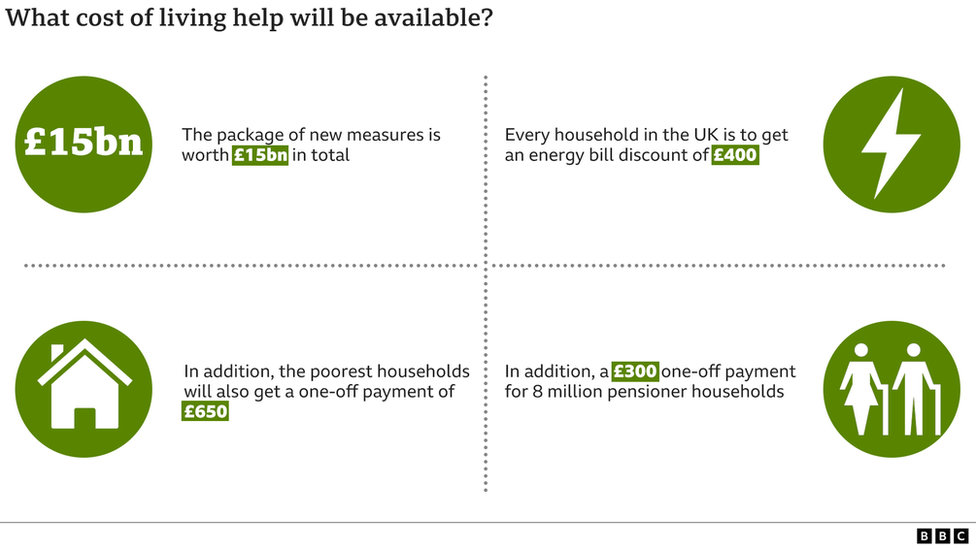
Reacting to the chancellor's statement, Mr Drakeford complained that the UK government had "finally acted on calls for a windfall tax" after "defending the huge profits of oil and gas companies for so long".
"This has taken months - months where people across the country have been worried about the rising cost of living and making ends meet," he said, on Twitter, external.
"Whilst this U-turn and increased support for those on lower incomes is welcome, the measures announced today barely scratch the surface.
"We will continue to do all we can to protect people in Wales from the cost of living crisis, and to push the UK government to do more."
'Electricity basically means I can live my life'

Disability Wales' worker Kat Watkins said her bill had doubled since April from £67 a month to £139
Kat Watkins has a brittle bone condition and uses an electric wheelchair and other equipment to maintain her quality of life.
The Disability Wales' worker, said her bill had doubled since April from £67 a month to £139.
"Electricity basically means I can live my life, because without it I can't move around because my electric wheelchair wouldn't charge, I wouldn't be able to breathe at night because I wouldn't have my ventilator to keep me alive," she said.
"I have a personal assistant and they live with me. If I chose not to heat my house for myself that's fine, but because I have people with me . I need to keep my house warm for them too, so gas is also important."
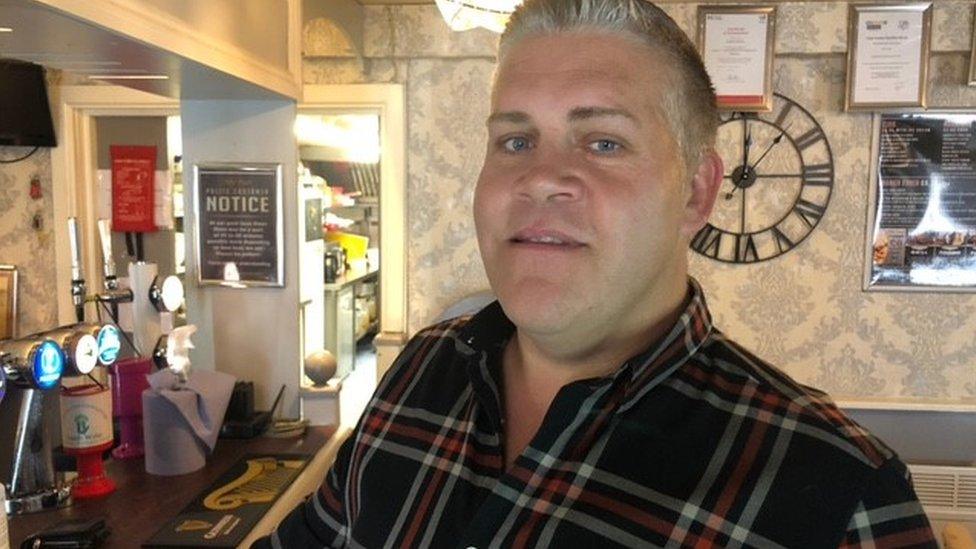
Rob James is offering cut price meals for people struggling to afford food
The Ivor Hael Hotel in Tonypandy initially offered free meals to the homeless and vulnerable at Christmas time, but will start providing meals at low cost for people in the community who cannot afford to eat, with pub "classics" offered for 50 to 80p.
Those eligible will get a voucher and then be able to pick up their food which is prepared by staff at the pub.
Rob James, the manager, said the staff noticed a drop in some of their regular customers who could not afford to eat out.
"The staff are there, the gas is on, the electrics are on, why not try to help people in need and people who are struggling", he said.
"So we've come up with the idea of why not try and get meals into these people's bellies, because we hear stories of people missing meals."
- Published26 May 2022
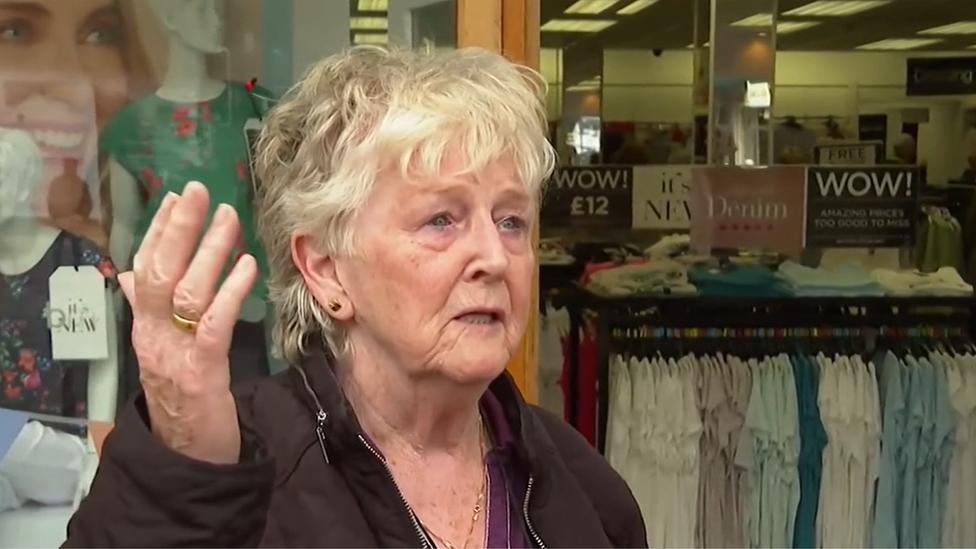
- Published26 May 2022

- Published24 May 2022
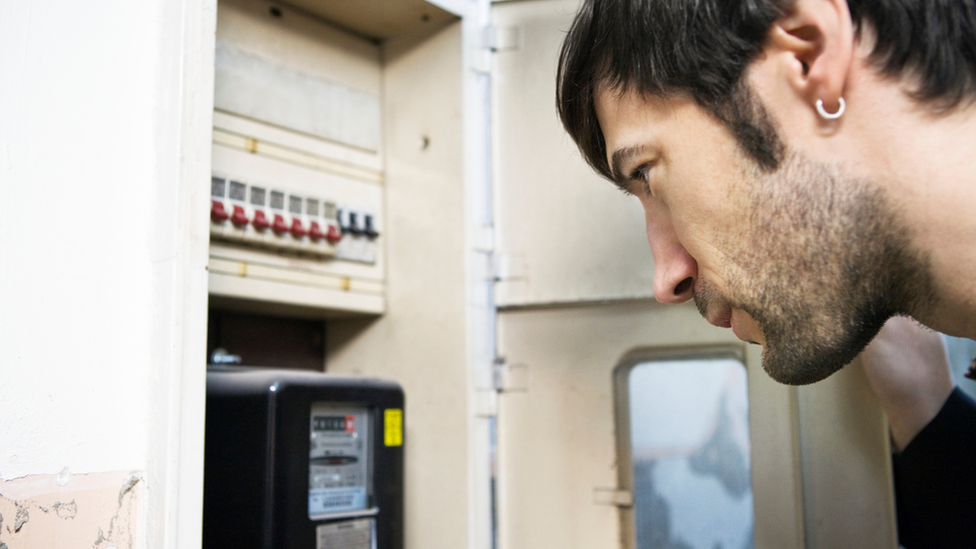
- Published20 April 2022
